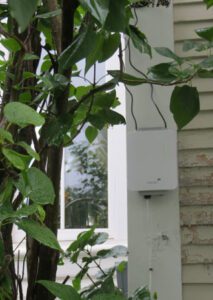
An access point providing Wi-Fi to Rochester Vermont’s zone.
In each town that I work with to install a Wi-FI zone, the experience is a little different, which is one of the things that makes the culture of Vermont unique. Every town has its own social structure, and its own set of people and organizations who care deeply about their town. Thanks to these differences, each town demonstrates new ways in which its citizens come together to help to create a Wi-Fi zone.
When a town applies to receive a Wi-Fi zone throughout its downtown area with the Digital Economy Project, we work inclusively with members of the town to turn the zone into a reality. Through our grant, we are providing the equipment and the cost of installation as well as constant support throughout the process, but once it is installed, the town itself will take ownership of the zone, continue to monitor the equipment, and pay for the internet connection for the zone. This means that somebody from within the town must be willing to cover the ongoing cost of an internet connection. The cost of an internet connection varies depending on the location, but for a business line, it is usually between $80 and $100 per month, or around $1,000 per year. Finding a way to pay for this has led to many varied solutions in different towns, and I am sure more will arise. Below are a few suggestions I point to when working with a new town to find a means of supporting the zone:
Add it to the Town Budget:
In some towns, I have worked directly with the town government to add the cost to the town’s budget. The Selectboard in Bennington, for instance, has recently agreed to take on the cost of the internet line for Bennington’s zone, and in Waterbury, the Selectboard voted unanimously to pay for the cost. When town members realize it is an important part of improving a downtown district, they are willing to budget for it.
Find a business group to sponsor it:
One of the benefits that comes with having a wireless zone is the ability to have a landing page that everyone who logs onto the zone will see. If you’ve ever logged onto a wireless connection at a hotel or in an airport, you know that after you agree to the terms and conditions, you end up at that hotel or airport’s website. In a town, you can be redirected to a site that shows the benefits of staying in town a little longer, showcasing local businesses. Because the Wi-Fi zone can benefit businesses in this direct way, groups of businesses in some towns have offered to cover the cost of the internet connection. This is what happened in Bethel, where the Bethel Business Association is sponsoring the zone. “Basically what we’re talking about is an advanced form of communication, and more importantly, an enhanced form of communication generally translates to an enhanced form of commerce, and that’s what the Bethel Business Association is all about,” said Neal Fox, the Bethel Business Association chairman. In other towns, such as in Burke, a local chamber of commerce is sponsoring the zone.
Find a local partnership or nonprofit to sponsor it:
Many towns across Vermont are lucky to have created downtown revitalization partnerships or economic development committees. In Vergennes, which received its Wi-Fi zone through our predecessors at e-Vermont, the Vergennes Partnership is responsible for maintaining the zone. In Rochester, the board of Pierce Hall, a community building that directly faces the green, has graciously agreed to take ownership of the zone. Perhaps other nonprofits or coalitions will do the same in other towns.
Fund the zone through local business advertising:
Thanks to the landing page discussed earlier, there is an opportunity for local businesses to advertise their services to people who they know are within walking distance of their location. For instance, logging onto the zone, a client is redirected to a page where she might see a coupon from a local restaurant offering a free appetizer if she shows the coupon at the restaurant. A business might be willing to pay $30 a month to sponsor such an ad, knowing that a potential customer who has seen that ad is close to the store. Put three ads like this on a landing page and the zone can pay for itself. This is what the town of South Royalton is doing.
Create the zone with “broadband donations” from local businesses:
I would strongly suggest that a zone have one dedicated internet line used solely for the Wi-Fi zone. This guarantees a certain amount of bandwidth (internet speed) for the zone itself. However, it is possible to create a zone by “borrowing” internet from a number of local businesses’ connections. For instance, if Al’s Coffee Shop has free Wi-Fi, and Julia’s Bakery down the road does as well, each business can host a piece of equipment on their building, keep their own hotspot, and donate any leftover bandwidth to the public zone. The more pieces of equipment “injecting” internet into the zone, the stronger it becomes, because if one line goes down, chances are the others will stay up. In Woodstock, the whole zone is created by working with a number of different businesses as well as the Norman Williams library, all of whom “donate” a portion of their internet bandwidth to “Wireless Woodstock.” This method has worked well for them, and we have replicated this method in other towns, but we do usually also have a dedicated line in order to guarantee the overall bandwidth to the zone.
